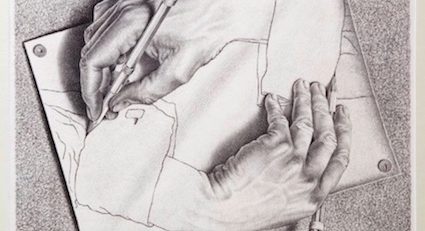The Leader’s Journey
Written By: Cahide Akkuzu
Reading time: approximately 5 minutes
If you do not see yourself as a part of the problem, you will never be part of the solution! Every culture teaches this approach to its society with several inspiring stories. Joseph Campbell’s famous book, The Hero with a Thousand Faces, which inspired the Star Wars series, is an inspiring leadership journey teaching this approach. At the beginning of the journey, the hero is a victim of the external circumstances, whereas at the end of the journey the hero is in control of his own destiny. The hero realizes that he can make conscious choices and determine his own attitude and behavior towards the external circumstances.
Stories shape our lives. During the 32 years of my professional work life, I have experienced how numbers and scores create stories that shape our thoughts and behaviors. During my work with leaders as an executive coach, I see how stories shape human life. Beautiful stories inspire me and give me hope for the future. It gives me hope to see how people can change their stories. How corporate citizen, no matter what level they are, can explore and make use of their true potential, liberate themselves to own their uniqueness, and no matter what the external circumstances are, add value to their work, themselves and their environment, and overcome the ‘obstacles’ by changing their story.
There are also other stories, where the hero is at the beginning of the journey. In their own story, they give everybody a role, and they give themselves the role of the victim, unknowingly!
Heroes are not just legendary characters. Heroes are storytelling examples of our best self, the state of our highest potential. They always remind us of who we really are, our potential and our power to determine our own attitude and behavior towards external circumstances.
In this article, I will offer you suggestions that can remind you of the hero in yourself and help you to write your own heroic story.
See problems as an opportunity to learn and grow!
A problem is not something independent of yourself. A problem is something that you do not like, therefore, this dislike situation is a problem for you. To deal with such a situation more effectively, you must place yourself in that picture, because you are actually part of that picture. What kind of contribution might you have made, consciously or unknowingly, in creating this situation? You are a victim of the external circumstances if you do not recognize your own, even if it’s just a little, contribution to the situation. When you recognize and understand your contribution, you will find it easier to see the problem as a challenge that can be solved. You will learn and grow from this experience.
The problem is that most of the time the other person disagrees with you, and the real problem for the other person is that you do not agree with them. There is no way out to this situation, even if you put a lot of time and effort into it, it will create a lot of unnecessary stress. You must recognize and look into the story. What is the story that you are holding on to? What is the role that you are giving yourself in this story? Are you giving yourself the role of the victim or are you the hero of this story?
Take responsibility!
Whatever the situation is, whoever is faulty, whoever caused the problem, none of this is important as long as you are effected by this situation. Finding a scapegoat, blaming others or blaming the external circumstances will not help you to solve the situation. This approach of fighting with the external circumstances will make you an innocent victim only, and the negative effect on you will not change. You must again change your role in the story from being the victim to being the hero by focusing on what you can do. If you are asking yourself: ‘Why is this happening to me?’ it means that you have given yourself the role of the victim.
We all know that there are so many external factors affecting a leaders’ goals. Competition, economic conditions, regulations, employees, bosses, colleagues, etc. These are facts. As the hero of your own story, chose your battle! Focus on and take responsibility for the things that you can do. Ask yourself:
- What is the most important thing for me to achieve under these circumstances?
- What can I do in this situation?
- What do I have control over?
- What are my options?
Focus on what you want!
Think of something that bothers you. Most of the time we spend all of our energy, time and effort on the things to avoid what we do not want happens. This approach does not help us to create what we actually want! When your whole energy and effort is on avoiding, your mind is in a negative state, and you actually unconsciously create more negativity. Instead, define what you want! Put your whole energy, time and effort on defining and describing in detail what you want. Set your mind up for what you want. I mentioned about the neuroplasticity of our brain in my previous article, if you want to read it again, you can reach that article by clicking this link:
In short, whatever we focus our brain on, it creates new circuits and develops new ‘muscles’. When we focus on what we do not want to happen, we stop ourselves from fulfilling our wishes. The only way to manifest our wishes is to keep our attention on the subject we want to create in a conscious and focused manner, and to improve our insight by regularly reflecting on our progress towards achieving our wish.
Use the true creation power of your brain and focus on what you want. Ask yourself “What do I really want?“ and visualize it as detailed as possible. What would you like to happen? How would you want it to develop and turn out to be? What is the most ideal situation or picture you want to achieve at the end? How will you know you have achieved what you want? What will you see or how will you feel when you have achieved it? When you focus on these types of questions, you are putting your focus on what you want. Your wishes will become more tangible and real. You will be able to set yourself measurable and observable standards for your own success. This will help you to create new circuits in your brain to make progress towards what you want.
Focus on your purpose!
Our wishes are what we think will lead us to our real purpose. We want to be promoted, because we will have more responsibilities and our income will increase, we will be happy by providing better conditions to our family and children with a better standard of living! What we want in this example is promotion, but our real purpose is to be happy. Take a much closer look at your wishes and ask yourself: “If you achieve this goal, what do you get that is even more important to you than this goal?” Take the answer. Ask the same question again by digging further into the answer that you just gave. Peel the onion further by asking the same question over and over for a few times and you will understand your real purpose behind your wish! Focus on that purpose! Your wishes are what you think will lead you to this purpose. There may be other ways that can lead you to your real purpose. When you focus on your wishes, and not your real purpose, you may not see those other options that may lead you there. The hero of the story is not blinded by his/her wishes, the hero is focused on his/her real purpose in order to be able to see all possible paths that will lead him/her there.
Define your own definition of success!
When your definition of success is to achieve a certain result, you are considering the option of either success or failure as an outcome. If you succeed to achieve this specific result, you may feel temporarily good, maybe only until you compare yourself with some other persons achievement or else. If you don’t achieve this specific result, despite all your efforts, you may see it as a devastating failure.
Create a definition of success for yourself that is beyond reaching a specific result. Your criteria may be about living your values, trying hard and doing your best to reach a goal, focusing on the experience rather than the end result or focusing on the learning along the journey. Any effort and outcome that overlaps with these criteria will give you lasting happiness. Whatever the end result, you will be able to take advantage of what you have learned on this journey. You have taken failure out of the equation.
Viktor Frankl was an Austrian psychiatrist who survived the Holocaust. In his famous book “Man’s Search for Meaning”, he described his experiences in a concentration camp during the Second World War. His experience offered proof that everything can be taken away from a concentration camp prisoner, except the ability to chose their attitude towards any set of external circumstances. The sort of person the concentration camp prisoner became was the result of an inner decision and not of camp influences alone. The inner decision here is clearly to decide on which role the person wants to give himself/herself in this terrifying story, to be a victim or a hero, no matter what the external circumstances are. He came to believe that a persons’ deepest desire is to search for meaning and purpose. Frankl’s definition of success and the description of the path that leads to success is quite inspiring:
‘’Don’t aim at success. The more you aim at it and make it a target, the more you are going to miss it. For success, like happiness, cannot be pursued; it must ensue, and it only does so as the unintended side-effect of one’s personal dedication to a cause greater than oneself or as the by-product of one’s surrender to a person other than oneself. Happiness must happen, and the same holds for success: you have to let it happen by not caring about it.”
Leaders have important responsibilities for the role they give themselves in writing their own stories. Leaders who play the role of the innocent victims have a short life span! Leaders who can write hopeful stories and redefine the definition of success in a way that inspires courage, hope, purpose and meaning to themselves and the people around them, and leaders who focus on a greater purpose than themselves, are permanent! Beyond two meaningless criteria such as winning and losing, these leaders focus on adding value to themselves and the people around them, no matter what the external circumstances are.
We are all heroes who write their own story. We can decide for ourselves what kind of story we want to be part of and which role we want to give ourselves.
Context Professionals Corporate Coaching and Consulting
https://www.contextprofessionals.com/en/



















